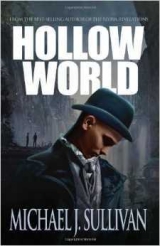
Текст книги "Hollow World"
Автор книги: Michael J. Sullivan
Жанры:
Научная фантастика
,сообщить о нарушении
Текущая страница: 19 (всего у книги 21 страниц)

Chapter Fifteen
Time Will Tell
Ellis and Pax arrived at Firestone Farm with a full force of twenty geomancers, including Geo-1 and Geo-12. It was believed that despite their indenture to Warren Eckard, the Cult of Ren, as Pax had dubbed it, would still be cowed by the awe-inspiring presence of an army of geomancers. Ellis imagined geomancers as some kind of cross between Tibetan monks and the firefighters of 9/11.
Once his eyes adjusted from the incandescent radiance that was the Geomancy Institute to the moonlight of the rural Midwest, Ellis saw that the farm was dark except for a single light that burned in the kitchen of the farmhouse. He also noticed, with some concern, that even the crickets had stopped their noise. In all the time he had been there, the crickets and frogs had been an overwhelming soundtrack. As they all stepped onto the surface of the world, they were greeted by only wind, rustling leaves. Ellis got the impression that the geomancers didn’t get out much. They stared at their surroundings like Iowans in Manhattan. A bunch of mad-scientists dressed in lab coats and safety glasses, they gathered before the open portal until it winked out, leaving them in darkness.
The farm felt different. The house, the road, the barn, even the fields had always been a virtual postcard from home. Ellis followed the line of the wooden fence, getting his bearings. As he did, he noted the dark loft-eyes of the barn and the field of corn. It all reminded him of a Stephen King novel. Something bad had happened there.
They were all still looking around when Ellis heard Pax suck in a breath. He followed the line of sight and saw the body on the side of the porch. Four steps later, Ellis could read the name ROB on the blood-soaked shirt.
“Another,” Geo-1 said, pointing down the lane to where another body lay.
Holding his gun in both hands again, and keeping an eye to the fields, Ellis walked down and turned the body over. It was Bob. Clutched in his hand was a pair of bloodstained sheep shears.
They all waited before the porch. No one wanted to go inside. Geomancers fought a daily, high-stakes battle with the primordial powers of a thermal dynamic planet, but two dead bodies in front of a farmhouse had left them helpless. Ellis wasn’t a cop, and had never served in the military, but he was from Detroit. This was his landscape, his jurisdiction, and that made it his job to look inside.
He advanced, holding his arms bent, the barrel pointing up the same way Jaclyn Smith used to in Charlie’s Angels.Why he didn’t think of Mannix, Adam-12,or Hill Street Blues,he didn’t understand. The door was open, and Ellis rotated in with extended arms, sweeping the room. He looked down the sights of the gun, still drawing from his vast repertoire of television, movies, and crime novels.
At first he thought the kitchen was empty. A wheezing sound told him otherwise.
His view was hindered the moment he stepped in front of the hurricane lamp mounted next to the door frame. The room became a frightening shadow play of his own silhouette. Scaring himself, but also knowing anyone waiting would realize where he was, Ellis felt his palms sweating again as he moved around the table, searching for the source of the wheezing. Three slow sidesteps later he found Yal seated against the lower cabinets, head slumped, chin to chest. Blood dribbled out of Yal’s mouth, soaking the white Amish shirt.
Movement behind him galloped his heart. Ellis turned, only to see Pax leading the geomancers in.
“It’s Yal,” Ellis said, and without knowing why, except that he felt more was needed, added, “Yal was a cook—the one who designed the minlatta we ate.”
With a face filled with dread and concern, Pax knelt down. “Still alive.” Pax touched Yal’s cheek, and the cook’s eyes slowly opened.
“We should get Yal to the ISP,” Geo-1 said. A portal popped open between the table and the iron stove. One of the geomancers went through. Soon after, three ISP associates rushed back out, carrying a stretcher device. Pax stayed with Yal until they sent the cook through the portal.
Ellis had other responsibilities, and searched the rooms. The Civil War funeral parlor was empty. The table and Warren’s chair were overturned. The main floor was clear, leaving him with the stairs. They creaked with Ellis’s weight. Great, he thought, nothing like announcing myself to the crazy at the top of the stairs with Warren’s hunting rifle.
He climbed with his back sliding up the wall, his arms out, aiming up the steps. His new heart was pumping hard, his stomach climbing its own set of steps up his throat. At the top of the stairs he found Hig, stabbed to death.
He entered Warren’s old bedroom and was carefully peering under the bed when Pax entered. “Pol and Dex are gone.”
“How do—”
“Yal,” Pax replied to the question he was about to ask. “Couldn’t talk, but I was able to see what happened.”
Pax sat on the bed, looking sick. Ellis put his pistol down and sat alongside, close enough that their shoulders touched.
“What did happen?” Ellis asked.
“Yal thinks Dex started it. Sabotaged Ren’s Port-a-Call, locking it—that’s why I had such trouble. I’ve been using POCs for centuries, and I had trouble figuring it out. Ren didn’t have a chance. If everything went according to plan, Ren would have died along with the rest of us. That would have left just those here on the farm—perfectly positioned to survive a holocaust—and whatever few survivors that might have escaped. Ren and Pol had both expected there would be some, but assumed they wouldn’t survive without the infrastructure of Hollow World. They had planned to hunt down and kill those who did, tracking them by their chips.”
“So Dex double-crossed Warren?”
“Hard to say. Yal doesn’t understand it, really. Maybe Dex and Pol were working together to take control, or they might have both been out for themselves, looking to double-cross the other. All Yal knows is that once it was revealed that Warren was dead, that his POC had been sabotaged, everyone started fighting.”
“Survival of the fittest,” Ellis said thoughtfully. “Warren got his wish. He wanted to toughenthem up, teach them the value of conflict, the value of reaching for the top. They learned well. So, where are Pol and Dex?”
Pax’s head shook. “Yal doesn’t know—just saw portals open. Yal expected to die—would have, too, if we hadn’t come along.”
“Will Yal be all right?”
“Physically, but Yal’s having trouble understanding their deception. People from Hollow World aren’t used to such behavior—Yal never saw it coming.”
Ellis sighed. “You can never tell what a person is thinking.”
Pax looked at him with a sad face. “I can.”
By the time they returned downstairs, more ISP associates were on the scene and most of the geomancers were gone.
“So, will this be the end of it?” one of the ISP associates asked.
“Cha!” Pax greeted the physician with a warm hug. “You got here fast.”
“Went to the ISP after the evac was canceled. Figured there might be injuries. People being careless with their POCs because of the alarm. So I was there when the accident alert was triggered.”
“I’ve missed you.”
“A lot of people have missed you,” Cha said. “Rumor had it…Well, I’m glad to see the rumors were wrong.” Cha turned to Ellis. “I hear you got a complete organ rework. Staying out of the sun now, I hope.”
“Nice to see you again, Cha,” Ellis said. “I never got a chance to thank you.”
Cha shrugged his tattooed shoulders. “It’s what I do. Speaking of which, if you’ll excuse me.”
Cha left them to speak to others on the stairs.
Ellis and Pax walked down and out of the house, where more people had gathered and lights had been set up. Several people recognized Ellis and headed their way. Pax grabbed Ellis’s hand, and the two slipped into the shadows of the cornfield, then out into the village.
They came out on Main Street and walked along the old-fashioned lane in silence. Too many emotions. Too many ideas and memories. Ellis found it hard to think. He would need a month just to sort through everything himself and decompress. Peggy was dead; Warren was dead. He didn’t feel as much as he should, just a certain dullness, which meant the wave was likely on hold. The same had happened with Isley. He didn’t react right away. Some people do. For Ellis, shocks took a while to settle in. This was the calm before the storm.
He didn’t know what to do about Pax. He’d spent almost four decades with a woman, and the only thing he had in common with Peggy was sex. Could the opposite work? Were his feelings even real? Maybe he just thought he loved Pax because of all they had been through together. Plus, Pax could read his mind and tell him exactly what he wantedto hear. Couldn’t that be a huge part of why he felt so comfortable?
Ellis glanced over, realizing that Pax was likely eavesdropping on him at that very moment. He stopped Pax in front of Wrights’ cycle shop and shivered with the autumn wind.
“Is it awful?” he asked.
“Awful?”
“Hearing other people’s thoughts. Knowing what they really think about you, about each other, about all the little stupid things. You were just listeningto me a moment ago, weren’t you?”
“A little.”
“I’m sorry if I—”
“Don’t be sorry. You shouldn’t be sorry about your thoughts. They’re who you are.”
“But it’s got to be awful, right? In all the science fiction books and movies, telepaths are usually driven insane because they can’t block out the constant thoughts of everyone around them.”
Pax looked at him dubiously. “Really?”
They were under the green-and-white-striped awning that shaded the picture window with the old-fashioned bicycle. Pax took a step and leaned against the lamppost near the curb before saying, “When you’re in public, you hear conversations, right? You can’t close your ears. You can’t nothear them. Does that mean you’re insane?”
“No, but I’m also not hearing everything,” Ellis countered. “Or is it like background noise? My wife used to have the TV on all the time for that very reason.” He looked at Pax, who looked so young. “Do you even know what a television is?”
“Of course I do. You had a big Sony projection screen that took up a lot of room. You used to flip-flop between getting a brand-new flat-panel model and a desire to just get rid of it altogether. Sometimes you felt that Peggy loved the television more than she loved you.”
Ellis raised his brows. “So you know—that’s good.”
“I also know it bothers you,” Pax said.
“That you hear every stray thought I have?”
Pax offered a nervous smile.
“Not in the slightest,” Ellis replied.
“Liar.”
“And I hate you, by the way,” he added.
“Liar.”
“Listen,” Ellis said, “if we’re going to continue…well, whatever this is…that’s something you’ll have to accept about me. I’m a habitual liar.”
“Liar.”
“Okay, now whose point are you proving?”
Pax started to speak and then stopped, looking puzzled.
“Ha!” Ellis clapped his hands together.
Pax smirked and then, reaching out, hugged him tight. “I love you.”
“Why?” Ellis really wanted to know. He didn’t have the gift to read minds, and he honestly couldn’t understand why a young, gifted person like Pax would care for a lonely, miserable old man.
“You aren’t miserable,” Pax said. “And you’ve seen my home—I love old things. And as for being lonely…well, everyone is. That’s something I hope to change. I want you notto be lonely. I spent my entire life trying to fix things, but I never wanted to fix anything more than to take away your sense of loneliness. To make you see that you deserve to be loved. That love really is possible, and not just something trivialized in books and on television. And you’re not alone; so many people feel the same way.”
“Is that it? Is that what I am? A broken watch you want to fix?”
“No.” Pax took a breath. “I love you because of everything I see in you. It’s because of how you took a chance, came to a new world, and risked your own life to save it, me, and all the people you didn’t even know. You’re so much better than you think you are. I can see you—who you reallyare—without the cloud of your self-doubt and the weight of your regrets. My gift is more than just the ability to hear thoughts, a lot more. It’s like I amyou, in a way. I don’t just know what goes on in your head, I understand it too. As twisted as Ren was, I understood him—even sympathized, because part of me was Ren. So I can see you very clearly, and believe me, you’re beautiful. But also I love you because…well…because you recognized me.”
“Huh?”
“When I showed up at the farm, dressed like this—like all the others—you knew it was me.”
“I don’t see why that’s such a big deal.”
“It is. Trust me. It is.”

The bodies had all been gathered up and spirited out. Ellis wondered what they did with them. If death was such a rarity, the earth sacred, and God nonexistent did they bother with burials anymore? The ceremonial burying of the dead was one of the first civilized things humanity ever did, the first thing that indicated empathy and a belief in an afterlife. What did it mean if such a fundamental milestone had been rescinded? What did it say about the human race going forward?
The thought disturbed him as he walked alone through the empty streets of Greenfield Village. Morning had come and gone as did all the people from Hollow World. Ellis moved down Main Street past the J. R. Jones General Store. The two-story clapboard front with big picture windows draped with red, white, and blue bunting looked like every general store Ellis had ever seen in a period movie. Maybe that was the reason the store—the whole village—felt more familiar, more precious than his own neighborhood. Ellis didn’t miss his suburban cookie-cutter home, but he did feel a loss for the general stores and the village greens that had once been the heart of communities. They were more than just places. They were icons of an era—of an epoch. Ellis could already see the untended grass growing high. Now that the members of the Cult of Ren had turned Greenfield Village into the crime scene of not just one, but multiple murders, would people stay away? Would the village be left to decay and disappear?
Ellis took a seat on one of the benches. The seat was cold. Autumn was coming to old Michigan and with it that strange phenomenon of being hot where the sun shone and chilled in the shadows. Night was coming earlier now. In two thousand years the seasons remained, and as always the turning of leaves and the shortening days depressed Ellis—just more dirt on a grave that was smothering him.
Despite what Warren thought, Ellis had read the Bible—or most of it, at least. He’d skimmed through parts where he felt God could have really used an editor. This probably made him the last living believer—God’s remaining faithful. Not that Ellis was all that faithful. He’d always felt it would be a toss-up which way he’d go after he died. He never felt he’d intentionally caused anyone suffering, but he hadn’t spent his life healing the sick of Calcutta or even volunteering at the local soup kitchen. Then there were the two killings. He hoped he’d get credit for saving millions of innocent lives, but who knew how the score was kept? Did the end justify the means? Would Jesus have condoned the killing of Hitler? Warren might have even been right. God routinely condoned mass murder. Or was Sol right? Was God something more, something that transcended the Bible? Was God not known—not knowable—because God didn’t exist yet, except in the form of a promise? Was heaven that point where humanity finally joined together as one? Would that act of uniting be the birth of God?
As a favor, Pax had gone to supply answers to the people of Hollow World. Pax knew Ellis didn’t want to face crowds yet, and there would be massive ones waiting. After the global evacuation, everyone knew about the bombs. Everyone would know the part he played. Not only was he unique, but now he would also be seen as the man that saved Hollow World. Ellis needed time alone to sort things out. He had a lot to sort.
He’d lost his son, his wife, his lifelong friend. He’d lost everyone he had known, and his entire way of life. In the New Testament, Jesus was quoted as saying: For what shall it profit a man, if he shall gain the whole world, and lose his own soul?Nowhere did it say anything about losing the whole world. But since he had, did that mean he could get his soul back? He’d felt an emptiness since Isley died. What he had done must be a mortal sin, and if he couldn’t forgive himself, how could he expect God to.
So now what?
Ellis looked at a row of sparrows perched along the peak of the general store. Each silhouetted against the clear late-autumn sky. Wind blew the grass. There were no voices, no sounds of traffic. The world felt dead. At least his world was, and lingering in a make-believe graveyard wouldn’t help.
Ellis had been kept busy since his leap forward. The few moments he had a chance to think had been moments he’d stopped treading water. He sank, only to be saved each time by currents driving him forward. But the currents had played themselves out, and Ellis had hours of isolated silence to ponder, to evaluate, to drown.
He tried to consider the possibility of a future, but before he could he had to face one inescapable truth. He couldn’t be with Pax. He knew Pax loved him, and he…How could he return those feelings? As he had told Isley, that sort of love doesn’t exist except between a man and a woman. And how could he be around Pax—who knew his every thought and that the feeling wasn’t mutual.
Ellis watched the sparrows all take flight, flying south as one flock.

Ellis walked down the lonely lane between the wooden fences.
November in Detroit had to be the definition for dreary. Once, long ago, it had conjured visions of gray slush, cars splattered with the chalk of salt, naked trees, yellow grass, and unforgiving skies. That day the snow was delayed, there were no more cars or roads to salt, but the grass had still yellowed and the skies remained just as vindictive. A handful of grocery-bag-colored leaves clung stubbornly to trees, their families and friends lost, blowing across the fields. Ellis was cold and shivered.
Pax found him there, alone on the road.
“My hero,” Pax said.
“Don’t say that. I—” Ellis’s voice choked. He couldn’t see and closed his eyes, forcing the tears out. “Pax…I can’t…I can’t love you.”
Ellis felt a thumb on his cheek, wiping the tears. “But you do love me.”
“No, I don’t.”
“Of course you do, Ellis Rogers. I can feel what you feel. You do love me—you just don’t know what love is.”
Hands cupped his face, lifting it gently. “All your life, you never learned, because no one showed you. Not your mother, who didn’t know how to express affection. Not your wife, who blamed you for the death of your son. Certainly not Warren. Not even your son, who didn’t trust that you would come around. None of you understood what love really is. It’s not lust, or dependence, or infatuation, or familiarity. Love isn’t a fondness or butterflies in your stomach.”
“Then what is it?” Ellis managed to ask.
“Love is the degree to which you are willing to sacrifice your own interests for those of another. It doesn’t matter what sex you are. It doesn’t matter who you are, or were. It only matters that you care more for someone else than you do for yourself. It’s when you eat minlatta with tarragon oil even when you hate pasta because someone with you enjoys it. It’s when you value being alone more than anything but agree to move in with someone because they need you. And believe this, Ellis Rogers, for I am quite certain that love is most certainly when you push away the one person in all the world you want to be with because you think your thoughts would cause them pain.”
Ellis couldn’t move. Couldn’t think.
“Give it some time. You’ve had a rough month.”
Ellis nodded. “I died right after you left, after I told you I was going to stay on the farm, did you know that?”
Pax nodded. “I sort of died then too. I hope you aren’t planning on killing me again.”
Ellis struggled to look at Pax—at that sympathetic face with those perfect eyes, stormy eyes, loving eyes. Ellis’s nose was running, and he wished he had a tissue—a good old-fashioned Kleenex or even a paper towel. Pax handed him the decorative handkerchief from a coat pocket. He blew, wiped.
“Does Alva still have that pattern for hot chocolate?”








